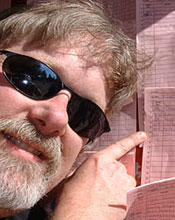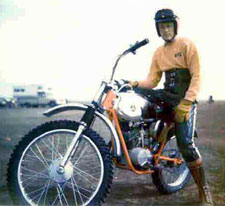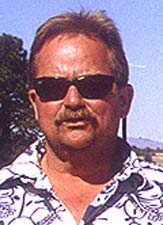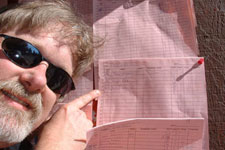
Stu Osborn |
AHRMA Cautious and Deliberate
with Rules Changes
by Stu Osborn #657
“The American Historic Racing Motorcycle Association is a member-owned nonprofit organization dedicated to enhancing the sport of historic motorcycle racing for the enjoyment of riders and spectators…”
This statement is smack-dab on the front of the AHRMA website and reflects the main intent of the Board of Trustees. But some AHRMA members wonder why it takes so long to adopt new rules or why certain rules change proposals are turned down year after year. This article will examine two issues before AHRMA in 2005 in an attempt to relate both the riders’ views and the opinion of the Board of Trustees as related by Chairman Dave Janiec in an interview for McCook Racing.
 When Janiec was contacted by MR a couple of months before his recent re-election as a Trustee it was with the thought in mind to discuss the proposition to create a new Pacific Northwest (PNW) Region for Vintage and Post Vintage Motocross, Cross Country and Trials and the proposed creation of an AHRMA 100cc Class for Vintage Motocross. According to Janiec, AHRMA takes note of the small bore racing which was prevalent in the 70’s. But they have decided not to create a Vintage 100cc Class nationally, citing that there are already 48 Vintage classes which make for a full racing day. Plus some trustees say there is already a 125 class to race in. Also several board members feel that there’s no proof the 100 Class would be “viable” and grow. So to prove its viability, AHRMA is asking racers to enter 125 classes on their 100’s at national events. In 2006 Robert Borg, owner of Northwest Maico & CZ, will sponsor trophies for the first 100cc rider to finish in Sportsman 125 or Classic 125 for all the ability levels at Nationals. Dick and Kay Mann will also be doing this in the Northwest Regional and Lumberjack series for the first 100cc rider who does not trophy in the Sportsman 125 or Classic 125 classes. This will also include all ability levels. The motorcycle must have been originally manufactured as a 100cc machine and it must be AHRMA legal for the Sportsman 125 or Classic 125 class. And since race officials are unfamiliar with the eligibility of 100cc machines, a rider that is familiar with 100cc eligibility must step up and help at sign-up to implement this program. In this way, AHRMA hopes this will encourage owners of 100cc machines to participate at NW events. When Janiec was contacted by MR a couple of months before his recent re-election as a Trustee it was with the thought in mind to discuss the proposition to create a new Pacific Northwest (PNW) Region for Vintage and Post Vintage Motocross, Cross Country and Trials and the proposed creation of an AHRMA 100cc Class for Vintage Motocross. According to Janiec, AHRMA takes note of the small bore racing which was prevalent in the 70’s. But they have decided not to create a Vintage 100cc Class nationally, citing that there are already 48 Vintage classes which make for a full racing day. Plus some trustees say there is already a 125 class to race in. Also several board members feel that there’s no proof the 100 Class would be “viable” and grow. So to prove its viability, AHRMA is asking racers to enter 125 classes on their 100’s at national events. In 2006 Robert Borg, owner of Northwest Maico & CZ, will sponsor trophies for the first 100cc rider to finish in Sportsman 125 or Classic 125 for all the ability levels at Nationals. Dick and Kay Mann will also be doing this in the Northwest Regional and Lumberjack series for the first 100cc rider who does not trophy in the Sportsman 125 or Classic 125 classes. This will also include all ability levels. The motorcycle must have been originally manufactured as a 100cc machine and it must be AHRMA legal for the Sportsman 125 or Classic 125 class. And since race officials are unfamiliar with the eligibility of 100cc machines, a rider that is familiar with 100cc eligibility must step up and help at sign-up to implement this program. In this way, AHRMA hopes this will encourage owners of 100cc machines to participate at NW events.
 Also, instead of handing over control of Vintage motocross and Trials to a new team of PNW race coordinators, the board last year voted to authorize discussion to create a PNW Region only for Post-Vintage MX and Vintage and Post-Vintage Cross Country. This move wasn’t exactly what PNW coordinators envisioned when Dirk Williams originally made his proposal to split from the Northwest Region but is moving ahead for 2006 anyway. AHRMA and the PNW team led by Dirk Williams discussed this for quite awhile during the holidays and then was formally announced on the AHRMA website on January 10. This new PNW (PV) region will consist of Oregon, Washington and Idaho with Williams committing to be the PV coordinator along with a team of assistant PV and CC coordinators. For VMX and Trials, the Northwest region will continue to consist of Washington, Oregon, Idaho, Nevada, and northern/central California under the leadership of Dick Mann and Ed Parsons for Vintage MX and Mike Fenner for Trials. For PVMX and Cross Country, the NW Region will include northern/central California and Nevada, under the leadership of Ric Tipton (PVMX) and Kelly Shane (CC). Also, instead of handing over control of Vintage motocross and Trials to a new team of PNW race coordinators, the board last year voted to authorize discussion to create a PNW Region only for Post-Vintage MX and Vintage and Post-Vintage Cross Country. This move wasn’t exactly what PNW coordinators envisioned when Dirk Williams originally made his proposal to split from the Northwest Region but is moving ahead for 2006 anyway. AHRMA and the PNW team led by Dirk Williams discussed this for quite awhile during the holidays and then was formally announced on the AHRMA website on January 10. This new PNW (PV) region will consist of Oregon, Washington and Idaho with Williams committing to be the PV coordinator along with a team of assistant PV and CC coordinators. For VMX and Trials, the Northwest region will continue to consist of Washington, Oregon, Idaho, Nevada, and northern/central California under the leadership of Dick Mann and Ed Parsons for Vintage MX and Mike Fenner for Trials. For PVMX and Cross Country, the NW Region will include northern/central California and Nevada, under the leadership of Ric Tipton (PVMX) and Kelly Shane (CC).
MR: “Concerning the board’s action on 2006 Rules Change proposals, specifically the creation of a Pacific Northwest AHRMA region, what was the determination and why was it handled the way it was?”
Janiec: “There was always the intent to split the Northwest region but the board wanted to make sure that the growth would be there in the Pacific Northwest to support full-day Vintage or PV events on quality tracks. We’ve seen slow growth but it’s not there yet. The majority of feedback the board received back in August was against the split at that time but the board realized it was the right thing to do for members living in Washington and Oregon. There were three California riders for every one Washington or Oregon rider at the NW races. And a lot of Washington races wouldn’t have broken even without the California guys showing up. In 2006, I would predict you’ll see more AHRMA events in the PNW region now with at least three or four 2-day events scheduled. And a Post-Vintage national is a possibility.”
MR: “What was the reason the board didn’t want to hand over complete control to the new PNW region for Vintage motocross and Trials to the team headed by Dirk Williams?”
Janiec: “This had never been done before so there was no precedent. The board wasn’t comfortable with handing over complete control because we didn’t see a clear understanding of tracks for Vintage bikes. And we wanted to see focused growth. When VMX and Post-Vintage run on the same day, VMX suffers and people quit or get a PV bike. So the board decided to grow the new region to serve the existing members with close coordination between the PV and Vintage coordinators. The PV and Vintage organizations will be working closely together.”
MR: “How can the new Pacific Northwest region eventually include Vintage MX and Trials? What needs to happen to make that a reality?”
Janiec: “There’s an experiment going on inside of AHRMA looking at the combined events and gauging entrants as well as looking at separate events and gauging entrants. We’ve noticed more entrants showing up to events where Vintage and PV are held on separate days. And it’s going to be a challenge to give Trials riders enough time to hold their events because having Trials on Friday or on Saturday combined with motocross on the same day, doesn’t allow much time for the Trials. We don’t want the Trials guys to feel short-changed because we are trying to keep the quality of the Trials events up too.”
MR: “Why didn’t the Board institute a 100cc Class for 2006? Specifically, why must the 100cc Class prove its viability in a way that’s bound to fail, namely by basing your decision on how many 100cc riders enter AHRMA events in the 125 Sportsman Class?”
Janiec: “One proposal asking to create a 100cc Class was received by the board and it got as much discussion as anything. But the class isn’t really established at a regional level yet. Once a new class is added, it’s very hard to get rid of it, if it doesn’t grow. The more classes there are the more awards need to be purchased. That’s a lot of money for trophies across the nation so we need to be conservative about adding classes unless there’s a very good chance of growth. There are 48 vintage classes and if the attendance of the regions is much lighter, it puts a heavier burden onto the promoters. We had some 100 Class offerings at a couple of nationals and we heard promises that riders would show up, but we never saw many at the races. So the board decided to stay with the Rules Change Committee’s original recommendation to encourage regions to organize 100cc Support classes.”
MR: “Are there any plans to keep track of how many 100cc riders enter 100cc Support Classes on a regional level?”
Janiec: “Yes, we will be keeping track of regional 100cc Support classes in 2006. We will also be getting the regional coordinators together and asking for feedback from them. As one trustee, I can tell you that if I see good turnout from the 100’s in the Sportsman and/or Classic classes at Nationals, or at the regional support level, I'd strongly support adding the classes. I had a Berkshire in the day, and I like the 100’s. I think the interest is there, and the time is right. Get the bikes on the track. I'd really like to see the class!
MR: “Besides entering 100cc bikes in the 125 class, what should we do as AHRMA members next year to make our voice heard about creating the class?”
Janiec: “For those interested in one or more 100cc classes, first enter your 100cc bikes this year is what I'd recommend. Second, submit a rules change proposal again and if the proposal isn’t turning out the way you would like to see, wait until the initial board comments and results are posted in Vintage Views magazine and on the website around the first week in September. Then compose a letter or email to AHRMA on the subject and focus on fact - send it to the Executive Director, Dave Lamberth. Third, take opportunities to talk to the trustees about your input anytime before the meeting. That can be at a race because face to face is always best and most effective. Or use the phone, email or letter. The first priority is to get a written comment to Dave, then to talk to the trustees.”
In closing, some VMX racers think AHRMA is just stalling and some just want AHRMA to trust that the 100cc Class will be “viable”. On a public email forum, one racer posted: “If all the 100cc racers show up and enter in the 125 classes and do well in those classes, there will be no need to add a 100 class so I wouldn't advise doing that.” Another well-known racer put it this way: “All I can tell you is that when I race and there is a 100cc class race there is always a good turnout if not a GREAT turnout. I am also seeing this class as a great entry level class for new riders to test the waters easily.” And finally there are those who choose to boycott AHRMA events over this issue. “Their extremely narrow minded view will not be supported with our time and money. We have expressed this view many times and AHRMA will change before we do. When you run a 100 in a 125 Class you bow to their clout. This is a bad way to treat their members, who supposedly own it.”
These skeptics think that AHRMA really doesn’t have all the members’ best interests at heart, are resistant to change in order to protect and preserve the old-school ways at the expense of progress and are much too slow to adopt members’ requests for rules changes. Although there are some AHRMA members who feel that changing the status quo should be bold, quick and decisive, it’s apparent that AHRMA Chairman of the Board of Trustees Dave Janiec supports change only when it’s in the best interest of not only the riders and spectators, but race promoters and all AHRMA members as well. It’s clear that preserving the history and integrity of the sport is at the fore-front of his mind, and right behind rider safety he says it’s the quality of the events that is most important.
***

Stu’s Back in the Winners Circle! …and is MR’s Roving Reporter |
|